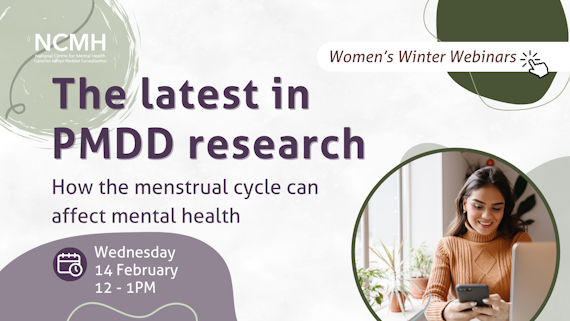Women's Winter Webinars: The latest in PMDD research
This event has ended.
Contact
Add to calendar

We’re pleased to be offering a webinar series discussing how reproductive events such as pregnancy, the menstrual cycle and reproductive ageing impact the mental health of women and people assigned female at birth (AFAB).
Each webinar will feature our researchers discussing their latest work in each area and people with lived experience sharing their personal stories of these conditions.
We’re running these sessions to raise awareness of the conditions and they are open to the general public, not just health professionals and people with an interest in mental health research.
This webinar will discuss the latest in PMDD research presented by psychiatrist Professor Arianna Di Florio and Psychology Assistant Chloe Apsey with a focus on the PreDDICT research at the NCMH.
What is PMDD?
PMDD is a mood disorder with symptoms occuring a week or so before the onset of menstrual bleeding (known as the luteal phase) and stopping once bleeding has begun.
Despite PMDD being directly connected to the menstrual cycle, it is not a hormone imbalance, but in fact a negative reaction in the brain to the natural rise and fall of estrogen and progesterone that occur during the cycle.
Symptoms of PMDD include:
- Mood/emotional changes eg mood swings, feeling suddenly sad or tearful, or increased sensitivity to rejection
- Irritability, anger, or increased interpersonal conflict
- Anxiety, tension, or feelings of being keyed up or on edge
- Decreased interest in usual activities eg work, school, friends, hobbies
- Difficulty concentrating, focusing or thinking
- And other symptoms, including physical symptoms eg breast tenderness, joint/muscle pain, bloating
About NCMH
The National Centre for Mental Health (NCMH) brings together world-leading researchers from Cardiff, Swansea and Bangor Universities to learn more about the triggers and causes of mental health problems.
We aim to help improve diagnosis, treatment and support for the millions of people affected by mental ill-health every year, as well as reduce the stigma faced by many. Key to achieving these aims is to engage with services and their users, the third sector and the wider public to increase understanding of mental illness, and by supporting and undertaking mental health research.